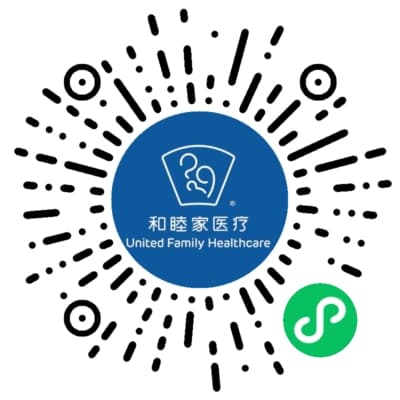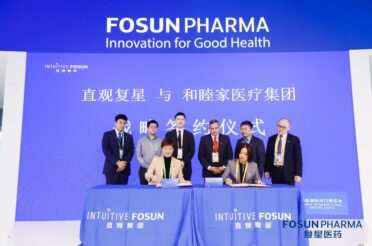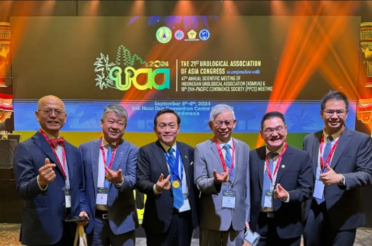Carl Wu’s commencement speech at the University of Hong Kong Faculty of Medicine graduation ceremony
Dear Vice President Professor Ian Holliday, Secretary of Health Prof Lo, Dean Professor Lau Chak Sing, Professor Rosie Young and Professor Felice Lieh Mak. Dear esteemed faculty members, graduates, families and friends. Good afternoon.
I am deeply honoured to be here on this very special day. Firstly, I would like to express my heartfelt appreciation for this invitation and extend my warmest congratulations to all the graduates, as well as the proud parents and family members.
As graduates from this world class institute, I have no doubt that many of you will go on to become very successful doctors, nurses, pharmacists, researchers, playing vital roles in building and advancing our healthcare system.
Today, I would like to start by sharing my personal journey. I grew up in China and studied economics in university in the UK. After my undergraduate study, I started my career in investment banking. As a young investment banker, my biggest client at the time was Blackstone, one of the world’s leading global investment groups. After being tortured on many sleepless nights assisting Blackstone on their corporate acquisitions, I joined the firm and spent 10 years working from London to Asia, and helped build Blackstone’s investment platform in Hong Kong, Beijing, and Shanghai. While I had a mildly successful investment career, I felt something was missing. I had an increasingly strong urge to roll up my sleeves and build something that I felt could make a bigger impact.
In 2016, exactly two weeks after I was promoted Managing Director at Blackstone, I handed in my resignation. Some of my colleagues and friends were shocked: I had a relatively high paying job in a reputable global company with a good career path. Why leave? Why did I make that choice to sail into the open? Against many friendly advice: my instinct told me it was something I wanted to do.
But I felt so anxious and insecure. As an entrepreneur, I would pay myself almost no salary for the first few years. Fortunately my girlfriend now wife Janice told me I must look forward and follow my dreams, and if this entrepreneurship thing didn’t work out, she would take care of the bills at home. Thank you dear.
So I did. But quitting my job was the easy part. What would I do next? At that time, my grandmother was 97, and I felt there had to be health solutions dedicated to people like her. China was aging rapidly, a social issue that we felt we could try to address head-on with innovation in service model. Yet, I had zero experience in healthcare.
After raising a small amount of seed capital, I decided to go to Shanghai, a city with arguably the most rapidly aging population in China. Our initial plan was to try to build nursing homes. However, we soon found out we didn’t have enough money and that Chinese families are reluctant to send away their elderlies.
This revelation prompted us to pivot. Instead of asking the patients to come to our nursing homes, why don’t we send healthcare workers to their homes? This approach was not only culturally more acceptable but also a cost-effective solution to addressing the needs of China’s rapidly aging population. We believed the future of healthcare should extend beyond the four walls of a hospital, and that more than 90% of the senior citizens could be cared for at home.
Fast forward to today, our home health services reach approximately 60,000 home patients daily across 43 cities in China. Our offerings have grown beyond providing care and nursing services. We use wearable technology and sensors for remote monitoring and chronic disease management, run training schools for care takers, provide senior-friendly home modification services and even build our own home health software. Shanghai recently published the latest data from home health services which we helped pioneer: every rmb invested in home health services resulted in 8.6 rmb reduction in overall healthcare expenditure.
While developing our home health network, we kept asking a daring question: surely, China had enough 3A hospitals, but why was the healthcare system so congested? We analyzed the data and found out that almost 80% of total healthcare expenditure in China occurred within acute hospitals. What China really needed was a rehabilitation system that accelerated the safe discharges of patients from acute hospitals.
Our team decided to embark on building our first rehabilitation hospital. We hoped to create a transformative environment where most patients admitted in debilitating conditions post surgery could regain their strength and walk again.
I remember our conversation with the landlord of our first rehabilitation hospital in Chengdu. They were so sceptical that a group of young entrepreneurs wanted to rent their 200,000 sqf former shopping mall for 20 years to build a “modern” rehab hospital. But we kept going: 7 years later, we now operate a network of 20 rehabilitation hospitals across China encompassing 8000 beds. Last month, Ailibi China released its ranking of the top 30 private rehabilitation hospitals: eight of our hospitals made the list.
While we were starting to gain momentum in post acute care. We were intrigued by the prospect of extending our network into acute care. We wanted to dip our toes by building outpatient clinics, which I presumed would require minimal investment and provide an ideal starting point. However, we were wrong: establishing an acute care setting was far more complex.
The prerequisites for success were multifaceted and demanding: a competent medical and nursing team, comprehensive service offering, standards in clinical quality and safety, allied support, good reputation, IT systems encompassing imaging to pharmacy, and ideally, in an optimal location. Unfortunately, our first attempts were unsuccessful and we had to write off our entire investment.
Despite this setback, we convinced our board to give it another try. In 2019, we decided to participate in an auction to purchase the land and building of a half built hospital in downtown Shenzhen. We opted for Shenzhen because there was almost no private healthcare in the city at the time. We had also wanted to avoid our biggest major competitor, United Family Healthcare (UFH), which already operated successful hospitals in Beijing, Shanghai, and Guangzhou.
Upon winning the bid for the building, I was immediately filled with apprehension. In retrospect, this was a bold move. We were about to embark on the construction of a 28-storey comprehensive hospital but we had neither a team nor experience in operating and building such a complex structure.
Fortunately, that same year, the shareholders of United Family were contemplating selling the group. Seizing the opportunity, we initiated the largest healthcare acquisition in China at the time and successfully completed the acquisition of United Family Healthcare in December 2019. After taking over UFH, we integrated our capabilities and further expanded the UFH health system from 6 to 11 hospitals and have also recently extended our reach to Hong Kong with Heal Medical. The Shenzhen hospital also successfully opened last year.
Two years ago, we realized that to be a truly effective provider, we also needed build a delivery system linking service provision to health payment. Therefore, we decided to launch our own health insurance solutions company, which has become one of the fastest growing health insurance platforms in China and now caters for about 200,000 members across the country. Many of our members benefit from our innovative primary care physician and 24×7 primary care manager program, leading to improved patient experience, health outcomes and reduced costs.
While we have much challenges and opportunities ahead of us, we are proud that over the past 7 years, we went from a start-up idea in Hong Kong to a company with 11,000 employees, operating a network of 30 hospitals and more than 200 home health and outpatient centers nationwide. We offer a wide spectrum of services, from corporate and individual health insurance plans, primary and virtual care, to general and specialty hospitals, rehabilitation hospitals, and home health services. This week, we announced our plan to construct a 1.5m sqf tertiary hospital to date in Beijing—our fifth in the city and largest in our system—which will serve as our teaching and research hub, aiming to not only provide world class clinical services, but also support the translation and commercialization of innovative drugs in China. This year, we are on track to service more than 10 million patient episodes in China.

Now, let me share with you three things that I’ve learned throughout my journey:
First, be humble:
You are among the most privileged graduates in Hong Kong, and it’s natural to be proud of your achievements. Before I started my entrepreneurial journey, I too had a high opinion of myself.
While it may appear from the outside that the entrepreneurs did most of the work and therefore deserve the glory. It’s not true. I am deeply humbled by how much it takes beyond an individual to make this work: my co-founder Antony for his relentless support, our fellow entrepreneurs and colleagues who left their successful careers to join our company because they believed in our cause, our investors who saw the opportunity in China’s private health sector, our clinicians and staff who believed these young entrepreneurs could make it work despite our lack of experience, our patients, the government and many of the esteemed professors here have so generously shared their time and energy to help New Frontier along the journey because perhaps they also believed we might be doing something special. While we were able to seize some of the right opportunities, we were also just in the right place, just in the right time.
I wish you remain humble and understand that success in healthcare isn’t just about individual accomplishments—it’s about working collaboratively and advancing together. It’s not just about you.
Second, get out of your comfort zone
Despite having no healthcare experience, we kept pushing ourselves to venture into the unknown. I always find that when I am put in a situation that feels uncomfortable or daunting, whether it’s quitting Blackstone, building our home health platform, acquiring and taking over management of our competitor United Family Healthcare, moving to China during covid, I am almost always awarded with the greatest opportunities for learning and growth. Sometimes, living life on the edge (career-wise, not medically) can lead to unimaginable accomplishments and incredible satisfaction.
Third, keep dreaming big and learn to trust your instincts
When we founded New Frontier, we had little idea what we were set out to do. Healthcare was not something we were focused on. We didn’t have a strategy to build what we have today, nor did the vision exist from day one. We simply saw the challenge of China’s rapidly aging population and decided to jump in, starting with home health, and then rehab, and then United Family, health insurance followed, and many opportunities popped up along the way and we ran after them because it made sense at the time. As we were growing, our heart just told us where we should go.
So don’t be afraid to dream a little bit. Trust your instincts—they are more powerful than you might think. I am confident that the next time you hear from New Frontier, we will have pushed our boundaries further and built something new.
Looking back, this entrepreneurship endeavour is by far the coolest thing I have ever done my life. I recently spoke to one of the first investors of New Frontier. When he decided to invest, we didn’t even have a name for the company, not to mention all the developments I just talked about. I asked him: why did you invest in us? If I were you, I probably wouldn’t have.
Hongchen paused and then quickly replied. He said, because I saw that fire in your eyes. Because of that fire he saw, he believed in us before I believed in ourselves.
As I was coming into this grand hall today, I saw many graduates along the way. I can see that fire in many of your eyes: the youth, the energy, the passion, the will to make an impact. I hope that as you embark on your new journey, you can continue to light up that fire. Push yourselves beyond your comfort zone, dream big and trust your instincts, but be humble. And don’t ever doubt that you can make a difference in this world by doing good by doing well, with love.
Congratulations once again to all the graduates, and thank you so very much for having me here today.

【演讲全文翻译】
新风天域联合创始人兼CEO、和睦家医疗CEO吴启楠先生在2023年香港大学医学院毕业典礼发表演讲
尊敬的副校长何立仁教授、卫生局局长卢宠茂教授、院长刘泽星教授、前院长杨紫芝教授和麦列斐斐教授。尊敬的各位老师、毕业生及各位毕业生的家人和朋友们,下午好。
能在这个特别的日子被邀请到这里,我深感荣幸。首先,我衷心感谢香港大学医学院的邀请,并向所有毕业生及你们的父母和家人们表示最热烈的祝贺。
作为这所世界一流学院的毕业生,我相信你们将成为杰出的医生、护士、药剂师和研究人员,在建设和推进医疗体系发展发挥重要作用。
今天,我想先分享一下我的个人经历。我在中国内地长大,在英国读大学,主修经济学。大学毕业后,我开始了在投资银行的职业生涯。作为一名年轻的投资银行分析员,我当时最大的客户是全球领先的投资公司黑石集团。在参与多个黑石投资并购项目并备受了多个“不眠之夜”的折磨后,我加入了黑石。在黑石工作的十年间,我从伦敦辗转到亚洲,并帮助黑石在香港、北京和上海建立了投资业务。虽然我的金融投资事业小有成绩,但我总觉得缺少点什么。我的内心有一种强烈的冲动,想要撸起袖子,自己去创造一番能够更加影响深远的事业。
2016 年,在我被晋升成为黑石集团董事总经理两周后,我递交了辞职信。我的同事和朋友们都很震惊: 我在一家全球知名的公司拥有一份薪水还不错的工作,有着良好的职业发展道路。为什么要离开?为什么要选择在达到新的事业高点就马上开始新的冒险?虽然大家给了我许多真诚的劝告,但直觉告诉我,这是我想做的事情。
但事实上,我深感焦虑,内心极度不安。作为一名白手起家的创业者,最开始的几年我在公司几乎不拿工资。我当时的女朋友现在的太太Janice告诉我,我必须向前看,去追逐自己的梦想,如果创业失败,家里她来买单。谢谢你,亲爱的。
但辞职容易,接下来呢?当时,我的奶奶已经 97岁,我想到中国需要有针对她这个年龄群体的医疗养老解决方案。中国的老龄化速度很快,我们认为可以通过服务模式创新来解决这一社会问题。但我没有任何医疗经验。
在筹集到种子资金后,我决定去上海,中国人口老龄化速度最快的城市之一。我们最初计划建设养老社区,但很快发现资金不够;而且受到传统文化的影响,很多中国家庭还是不愿将家里老人送进养老社区。
这一步给了我们启发,让我们迅速转变方向。与其让病人到养老社区来,为什么我们不派医护人员到老人家里去呢?这种方法在文化上更容易被接受,并且也是解决人口老龄化问题的一种经济有效的方法。我们相信,未来的医疗保健应超越医院的四面墙,90% 以上的老年人应该可以在家中得到高质量的护理。
时过七年,我们的家庭医疗服务已覆盖中国 43 个城市,每天为约 60,000 名患者提供家庭服务。我们提供的服务已不仅仅局限于护理和照护,还利用可穿戴技术和传感器进行远程监控和慢性病管理,开办护理培训学校,提供居家适老化改造服务,还开发了居家医疗软件。最近,上海公布了居家护理服务的最新数据:在居家护理上每投入 1 元,将节约医保基金8.6 元。
在发展居家医疗事业的过程中,我们不断大胆问我们自己:中国不缺病床,但为什么我们的医疗系统仍然拥挤?我们分析数据后发现,中国医疗总支出的近 80% 用于医院内治疗,中国可能更需要建立完善的康复医疗系统,让患者能够安全出院,把宝贵的临床医院资源周转起来,服务到最有需要的患者。
我们的团队决定着手建设我们的第一家康复医院,希望创造一个变革性的康复环境,让大多数术后的病人能够恢复功能,重新行走,重建生活质量。
我还记得我们与当时房东的对话:几个年轻没有医疗经验的小伙子想签一个20年的租约,将一个2万平方米的商场改造成为一所 “现代化 “的康复医院。7年后的今天,我们已在全国运营着20家康复医院,覆盖8000张床位。上个月,艾力彼中国发布了民营康复医院 30 强排行榜,我们的 8 家医院榜上有名。
在居家和康复医疗领域获得发展势头后,我们开始着眼于将服务网络扩展到急性期临床领域。一开始,我们想通过建立门诊部来作为尝试,这是一个低风险的起点,并且需要相对少的投资。然而,我们错了:建立临床医疗机构要比想象中复杂得多。
临床医疗机构的成功要素复杂且苛刻:需要优良的医疗和护理团队、综合的科室服务、临床质量和安全标准、良好的声誉、覆盖从影像到药房的全方位IT 系统,好的地点。很可惜,我们很快就失败了,也亏损了我们投入所有的资金。
尽管遭遇挫折,我们还是说服董事会让我们再试一次。2019 年,我们决定参加竞标深圳市中心一家烂尾的医院建筑(深圳三九医院)。选择深圳是因为当时深圳几乎没有私立医疗机构,同时我们也希望避开我们最大的竞争对手和睦家医疗集团。和睦家在北京、上海和广州当时已经拥有多家相对成功的私立医院。
在赢得深圳三九医院项目竞标后,我马上开始焦虑。现在回想起来,这是一次大胆的举动。我们计划开始建造一座 28 层高的综合医院,但我们既没有团队,也没有运营和建造如此复杂医疗机构的经验。
幸运的是,同年,和睦家的股东们正在考虑出售。我们抓住这个机会,发起了当时中国最大的医疗并购,并于 2019 年 12 月成功完成了对和睦家医疗集团的收购。接管和睦家后,我们合并了两家公司的运营能力,也进一步将和睦家医疗体系从 6 家医院进一步扩展到 11 家医院,并创立香港希愈医疗,将我们的业务延伸到了香港。深圳和睦家医院也于去年成功开业。
两年前,我们意识到,要成为一家真正的医疗服务提供商,还需要建立一个将服务提供与医疗费用支付挂钩的交付系统。因此,我们决定成立健康保险解决方案公司,该公司已成为中国发展最快的健康保险平台之一,目前为全国约 20 万名健康险会员提供服务。我们的许多会员都受益于我们创新的家庭医生和24×7健康管理师计划,改善了患者体验、提高了健康水平并降低了成本。
虽然我们面临着许多挑战,但令我们感到自豪的是,在过去的 7 年里,我们从香港开始的创业,发展成为一家11,000 名员工的公司,在全国运营一个 30 家医院和 200 多家门诊中心和居家护理站组成的医疗网络。我们提供从企业和个人医疗保险计划、初级保健和线上诊疗,到综合医院和专科医院、康复医院和居家医疗等一体化的综合医疗服务。本周,我们也正式宣布计划将在北京建设一所 15 万平方米的三级综合国际医院,这是我们在北京的第五所医院,也是我们系统内最大的医院,它将成为我们的教学和研究中心,不仅提供国际化的临床服务,还将支持创新药物的转化和商业化。今年,我们将在中国为超过1000万例患者提供医疗健康服务。

现在,我想跟大家分享我在整个创业旅程中学到的三件事:
首先,保持谦虚:
你们是香港最优秀的一群毕业生之一,理所当然会为自己的成绩感到骄傲。在创业之前,我也稍微有点骄傲。
虽然在外界看来,创业者是非常辛苦的,理应获得荣誉和称赞。但事实并非如此,我们的发展远超我个人的努力所能及。其中包括:新风天域的联合创始人Antony (梁锦松) 给予了我们不懈的支持;和我们一起创业同事们因为相信我们的事业而放弃了自己原本就蒸蒸日上的职业,加入了我们的公司;我们的投资人看到并相信了中国医疗行业的机遇;我们的临床医护团队和员工相信我们这批没有医疗经验的创业者;还有政府、我们的患者;还有在座的多位教授们慷慨地为我们公司贡献了他们的时间和精力,可能他们也相信我们正在做一份有意义的事业。虽然我们成功抓住了宝贵的机遇,但是我们也恰逢天时和地利。
我希望你们保持谦虚,意识到医疗事业的成功并不仅仅是个人的成就 — 而是需要通力合作、共同进步。这不仅仅是你一个人的事。
第二,走出舒适区
尽管没有任何医疗行业经验,我们仍不断鞭策自己向未知领域进军。我发现,当自己处于一个感觉不舒服或令人生畏的环境中时,无论是离开黑石、建立居家医疗、收购并接管和睦家医疗,还是在新冠疫情爆发初期搬到内地,我总是能获得最大的学习和成长机会。有时,冒一点风险会带来难以置信的成就和满足感。
第三,保持远大梦想,相信自己的直觉
创立新风天域时,我们只是看到了中国人口迅速老龄化所带来的挑战,并决定投身其中,从居家护理开始,然后是康复医院,然后是和睦家,接着是健康保险,一路上出现了很多机会,我们紧紧抓住这些机会,我们的内心的直觉总会告诉我们应该往哪里去。
所以,不要害怕梦想,相信你的直觉,它比你想象的更强大。我相信,下一次当你听到新风天域的时候,我们会已经又突破了自己的界限,创造出新的业务。
回顾过去,创业是我这辈子做过的最酷的事。最近,我与新风天域的第一位投资者聊天。当他决定投资的时候,我们的公司甚至还没有名字。我问他:你为什么投资我们?如果我是你,我可能不会投资。
他(宏丞)停顿了一下,然后很快回答道。他说,因为我看到了你眼中的那团火。因为他看到了那团火,他在我相信我们自己之前,他就选择相信了我们。
今天,我来到这个大会堂,一路上看到了许多毕业生。我从你们的眼中看到同样的那团火:你们的青春、活力、激情、和想要产生影响的意愿。我希望,在你们踏上新的征程时,能够继续点燃这团火。迈出你的舒适区,大胆造梦,相信自己的直觉,但保持谦虚。不要怀疑自己,你们可以通过爱心去做好事来改变这个世界。
再次祝贺所有毕业生,非常感谢你们今天邀请我来这里。











